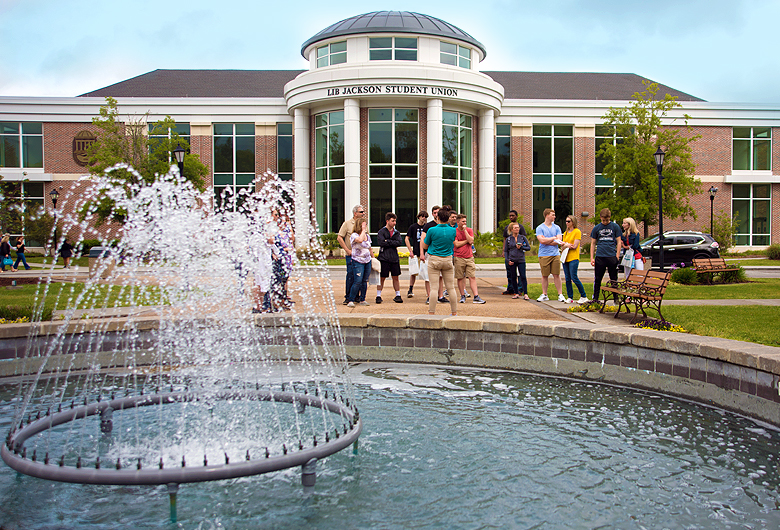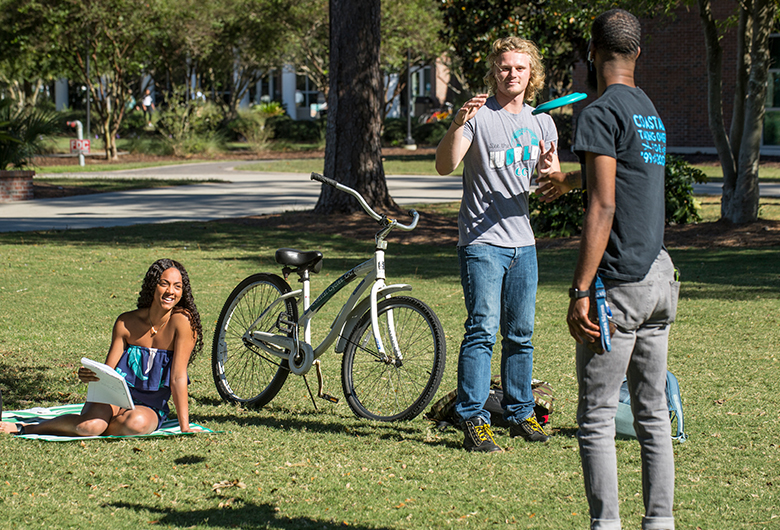As a Resident Adviser (RA), you will be invested in the overall growth and welfare of each resident in your area and ultimately responsible for facilitating the development of your community. RAs are available and accessible to residents, assisting them with personal, relational, social, cultural, emotional, and academic needs. You will get to know each resident in your community, beyond their name, and help them feel like important members of your community. These intentional relationships are essential in helping residents feel more comfortable with your role as a leader in programming, conflict resolution, policy enforcement, encouraging involvement, role modeling, accessibility, and genuine care.
In the eyes of residents, one of the most important criteria in evaluating their RA is the RA's availability. To effectively demonstrate this, an RA will need to spend a significant amount of time in his or her community, visiting/being available to residents. To be perceived as approachable, an RA must respond to all residents in a friendly manner, avoid the appearance of exclusive relationships, and complete all expectations in a fair and consistent manner.
Resident engagement is a primary function of the Resident Adviser (RA) position. More than just programming, engagement applies to nearly every task and duty that RAs perform: on-call walkthroughs, roommate agreements, health and safety inspections, spontaneous social activities, one-on-one meetings, and much more. Active engagement by our RAs is a significant part of what differentiates our residence hall living from "dorms." For students enrolled in colleges and universities, being involved on campus and in their residence hall communities has been linked closely to academic success and persistence to graduation (Pascarella & Terenzin, 2005). RAs are guided in their engagement efforts by University Housing's CHANT Engagement Model: Community, Holistic Wellness, Advocacy, Networking, and Transition. These themes encompass the experience that University Housing strives to deliver to all residential students.
As a Resident Adviser (RA), you will be a part of an innovative and dynamic University Housing team. Supervision will be under a masters-level, professional Area or Community Coordinator (AC/CC). The relationship with the Coordinator is one of the richest learning opportunities for an RA. Among the most important of the many roles of the Coordinator is encouragement and support of personal and professional development of individual RAs. In addition, relationships with fellow RAs provide significant support, empathy and friendship. You and your RA staff will work together through training, staff meetings, programming, and a variety of University Housing assignments and operations.
As a Resident Adviser (RA) it is critical to hold yourself to the highest standard possible. RAs must be able to balance their academics, RA role, and a personal life in order to be successful role models to their peers. Being a strong role model extends beyond merely upholding laws and policy. You will be expected to connect with all members of your community, communicating through diverse differences with respect. As solid relationships are developed, the way you confront inappropriate behaviors, utilize social networks, and role model academic commitment will be noticed by your community. Being an RA is a significant responsibility and being a responsible, caring and assertive role model is essential.
Resident Advisers (RAs) play an important role in the management and operation of the University Housing communities. Ensuring excellence in our University Housing facilities is a top priority for all staff. As an RA, you will do your part in reporting, addressing, and following up with a variety of facilities concerns. Regular health and safety inspections are conducted by RAs, in addition to, consistent education about maintenance and custodial roles and resident responsibilities. RAs are not only expected to report emergency situations, but also step up and address any and all concerns in their community. RAs also have responsibilities in occupancy management, room changes, check-ins and check-outs, and damage assessment. Strong communication skills are developed by RAs as they manage multiple processes and work with multiple people.
Resident Advisers (RAs) fully participate in staff training and development activities including weekly Tuesday night staff meetings, fall and spring training, on-going training, in-service requirements, staff development activities, and staff retreats. Fall RA Training typically starts around August 1 each year. RAs may not schedule classes or other commitments on Tuesday nights after 7 pm.
The Resident Adviser On Call (RAOC) work to reinforce community and serve as part of a staff rotation. While on call, the RAOC will engage residents of the community by speaking with people and being visible within the community. In addition, the RAOC will address any policy violations, facilities concerns or other incidents that occur according to proper protocol.
On call hours are Monday through Friday, 5 p.m. through 7 a.m. Weekend on call hours are from 5 p.m. Friday until 7 a.m. Monday. On call responsibilities rotate among RA staff according to community needs. RAOCs are available and accessible in the community throughout that time. On call engagement rounds and community walkthroughs are required as part of on call duties.
In addition to the Resident Adviser position, RAs may be employed, active on-campus or in the community, hold volunteer/club memberships or hold internships/practicums up to 20 hours per week. All additional involvement must be approved by RA's supervising Area/Community Coordinator before committing. All additional involvement commitments are factored into an RA's 20-hour allowance. For example, if an RA chooses to work 15 hours a week and volunteer two hours a week, this leaves three hours a week to be involved in student groups and other campus activities.
A maximum of two consecutive weekends away are allowed at the Area/Community Coordinator's discretion. There will be weekdays and weekends Resident Advisers (RAs) will not be permitted to leave campus due to Resident Adviser responsibilities. RAs are expected to spend all nights in their room unless specific permission is granted from the Area/Community Coordinator.
University Housing assigns Resident Advisers (RAs) to a residential community based on departmental needs and, in rare cases, reassignment may be necessary. RAs are not permitted to request specific roommates.
Resident Advisers (RAs) receive a cost free room based on availability in their specific area and a meal plan. In addition, the $150 housing application fee will be refunded to an RA after acceptance of the RA position if paid during the housing application process.
RA compensation may affect financial aid award
The federal government requires Coastal Carolina University to monitor all the resources available to a student who receives federal financial aid. If you have applied for or are receiving financial aid, it may be affected if you become an RA. As an RA applicant, it is your responsibility to check with the Financial Aid Office before accepting an RA position to determine what financial aid adjustment, if any, might be necessary.
Back to Student Positions >>
Related Links |
Contact Information |
|
University Housing Township Circle Desk Elvington Loop Desk University Place Desk |
University Housing creates a foundation of care for resident safety and success.





